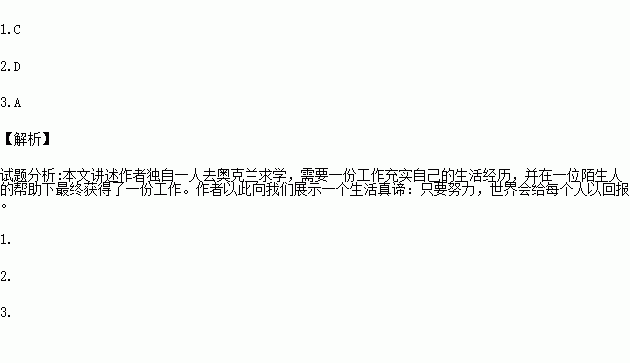题目内容
When I began planning to move to Auckland to study, my mother was a little worried about the uncertainty of living in a place that was so different from India, where we lived. She worried particularly about the lack of jobs and cultural differences and the chance that I would face racism(种族主义).
Despite these concerns, I came to New Zealand in July 2009.I found the place and the people very nice and supportive. Soon after I arrived, I realized the importance of getting a job to supply my living expenses.
Determined to do this on my own, I spent a whole day going from door to door for a job. However, I received little or no response.
One afternoon, I walked into a building to ask if there were any job opportunities. The people there were very surprised and advised me not to continue my job search in that manner. As I was about to leave, a clerk in the building, who had been listening to what others had said, approached me and asked me to wait outside. Fifteen minutes later, he returned, and asked me what my plans were and encouraged me to stay confident. Then he offered to take me to his friend’s company, Royal Oak, to search for a job. The following day, I received a call from a store in Royal Oak offering me a job.
It seems that the world always gives back to you when you need it. And this time, it was a complete stranger who turned out to be a real blessing.
1.What wasn’t the author’s mother worried about?
A. There might be cultural differences.
B. People might look down on the author.
C. The author couldn’t speak the local language.
D. It might be difficult for the author to find a job.
2.After staying in New Zealand for a short time, the author .
A. decided to go back to his own country.
B. felt the local people were not very friendly.
C. wanted to get a job that needed practical skills.
D. had to find a job to cover his living expenses.
3.When the author went into a building to look for a job, .
A. a clerk gave him encouragement and advice.
B. he was confident that he would find a good one.
C. he found many college students like him already there.
D. a clerk recommended him to the company he worked for.


 横线,并在该词下面写出改正后的词。
横线,并在该词下面写出改正后的词。